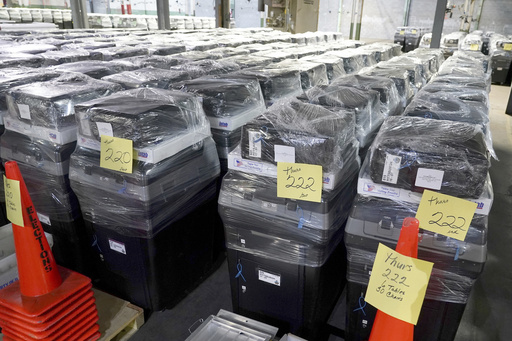
In Washington, officials have stated that hacking into a local election system in the United States poses significant challenges. The possibility of covertly altering a substantial number of votes to sway the outcome of a presidential election is considered nearly impossible. This resilience stems from the decentralized nature of the systems, the presence of paper records for nearly all ballots, rigorous post-election reviews, and the dedicated work of election officials, volunteers, and citizens over the years.
However, foreign agents and domestic extremist factions have identified a more vulnerable target: the public’s perceptions and emotions. These groups seeking to erode confidence in the democratic process do not necessarily need to tamper with the votes directly; they merely need to persuade enough individuals to doubt the results. This situation is particularly alarming to intelligence analysts and officials, who have taken on the responsibility of safeguarding elections in the United States. An adversary could attempt to breach a state or local election system and subsequently release documents—either fabricated or based on publicly accessible material—claiming they represent evidence of electoral fraud.
Alternatively, manipulated videos could emerge, showcasing purported hacks into ballot scanners, voting machines, or voter registration systems, despite these incidents not occurring. This tactic, categorized as a “perception hack,” might not involve genuine breaches of voting mechanisms but is crafted to make it appear as if they have been compromised. In some instances, small information could be harvested, lending credibility to such videos without affecting actual vote counts. Additionally, misleading footage suggesting election workers are destroying ballots poses a related threat.
Ultimately, the goal behind these actions is to sow confusion, distrust, and fear among voters. Across the nation, government entities have made progress in fortifying election infrastructures; nonetheless, the manipulation of human emotions remains a challenging frontier.
Adam Darrah, a former CIA political analyst now serving as the vice president of intelligence at cybersecurity firm ZeroFox, anticipates that perception hacks are probable occurrences. He asserts that instilling the belief that election systems are fragile is significantly simpler than executing an actual breach. This strategy can provoke public panic, highlighting the disparity between the technical resilience of voting systems and the emotional vulnerability of the populace.
Narrow margins of victory or delays in vote counts might exacerbate the risks of perception hacks deceiving voters, which could polarize the electorate, incite potential political violence, and complicate the transfer of power scheduled for January.
Recently, intelligence officials voiced concerns that nations like Russia and Iran might promote unrest in the U.S. following election outcomes. Analysts agree that while Russia appears to endorse former President Donald Trump, Moscow primarily seeks to fracture American unity and undermine support for Ukraine and NATO. Officials say that adversaries tend to favor disinformation tactics because they recognize the robust nature of the election infrastructure, making extensive hacking difficult.
Despite intelligence assessments, both Russia and Iran have refuted allegations of attempts to meddle in the U.S. elections. A representative from the Russian Embassy in Washington asserted in an email that their country has never intervened, is not doing so, and has no intention of interfering.
Furthermore, even in the absence of foreign influence, isolated instances of long polling lines, ballot discrepancies, or other irregularities may serve as fodder to undermine the credibility of elections. This scenario unfolded in 2020 when Trump amplified concerns regarding electoral integrity, contributing to the January 6, 2021, insurrection at the Capitol by his supporters aiming to disrupt the certification process.
As the aftermath of the current election approaches, Trump has laid the groundwork to contest the results should he lose, fostering a belief among his followers that potential defeat would result from Democratic deception. “They only way we’re going to lose is if Democrats cheat,” he declared at a recent rally in Michigan, implying that they resort to dishonest tactics.
Following the election, crucial days are expected as results are revealed and a divided electorate processes a contentious campaign. Scholars like Paul Barrett, a New York University law professor focused on online discourse and polarization, warn that authoritarian regimes or domestic extremist groups will seek to incite distrust to motivate individuals toward action.
To counter these challenges, national security and election officials throughout the nation are actively combating disinformation and swiftly addressing falsehoods. Top intelligence figures have conducted multiple briefings outlining potential threats from foreign entities, while cybersecurity and election experts continuously reassess the security of election systems.
A recent video falsely portraying the destruction of mail-in ballots in Pennsylvania circulated on social media. However, bipartisan officials in Bucks County promptly debunked this footage, linking it to wider Russian efforts targeting Vice President Kamala Harris and her running mate, Minnesota Governor Tim Walz.
Kim Wyman, a former Washington state secretary of state involved with the Cybersecurity and Infrastructure Security Agency, noted that while the video was swiftly discredited, its existence still perpetuates uncertainty. “The issue is that the false narrative will linger,” she remarked, emphasizing the potential for continuous circulation of misleading information.
To prevent the success of perception hacks, experts urge Americans to refrain from perpetuating electoral hoaxes. Voters are encouraged to look for various information sources, remain critical of anonymous claims on social media, and seek verified information from state and local officials. The period following voting is likely to generate heightened uncertainty and emotions—exactly the environment foreign adversaries and domestic extremists thrive on to erode trust.
CISA senior adviser Cait Conley emphasized that foreign adversaries are intent on exploiting the American democratic process to advance their agendas. “Americans should trust that their votes will be counted accurately and that adversaries will try to sow doubt about this,” she advised. Conley encourages vigilance and verification of information, urging individuals to rely on reputable sources like local and state election officials to mitigate the effects of disinformation.
